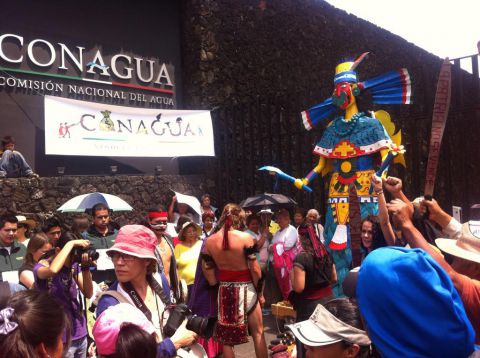 Mexican campaigners turned out in force on World Water Day, calling on the government to re-think water legislation
Mexican campaigners turned out in force on World Water Day, calling on the government to re-think water legislation
By Nathalie Seguin
On the eve of the World Water Day celebration, the Mexican government has tried to celebrate the Human Right to Water and Sanitation by presenting a law to congress that is going in opposite direction to achieving this fundamental right.
Fortunately, Mexican civil society, that has been writing its own law proposal during 2 years in a participatory and inclusive process with communities, academia and civil society organisations, was ready to face this and is urging the government to keep their international and constitutional commitments they have taken.
To recap on what exactly those commitments are, the Mexican government has ratified the International Covenant on Economic, Social and Cultural Rights (IESCR) where article 15 states “the human right to water is indispensable for leading a life in human dignity. It is a prerequisite for the realization of other human rights”, and in 2010 the resolution, adopted by consensus by the Human Rights Council, affirms that the right to water and sanitation are part of the human rights recognised in international law, and confirmed that these rights are legally binding upon States.
The first article of the Mexican constitution recognized international treaties as maximum law in 2011, and in February 2012 also included the Human Right to Water after reforming the 4th article.
But now, the National Commission of Water CONAGUA, managed by David Korenfeld the president of the UNESCO-IHE Institute for Water Education, and the National Association of Water and Sanitation Enterprises (ANEAS) has tried with the help of 3 political parties (PRI, PAN, and PVEM) to fast track a very controversial law that threatens directly and highly put in risk the human right to water and sanitation.
When congress asked for a new water law, it seemed the perfect opportunity for the country to change the unsustainable pattern of water management that has taken the country from a 18000m3per person per year of water availability to less than 4000m3 per person per year in 60 years. More than 80 % of superficial waters are polluted, with a strong overexploitation of ground water and high water stress in many regions of the country due to the water management.
At least 13.8 million people are without access of water infrastructure, and this is without even taking into account if the water is reliable and of good quality. At least 37% of population is lacking of safe access to sanitation, which is more than 40 millions of people.
Instead of taking this opportunity to offer its citizens a future and the country a truelly sustainable development by changing this catastrophic pattern of water management, the new law will limit the access to water as a human right; only giving access to those living in legally constituted human settlements, and denying the right to swathes of the population who live in informal settlements. The law is, simply, a distortion of the international definition of the Human Right to Sanitation, and is exactly opposing one of the essential aspect of human rights, the right to the person and not depending where he/she lives.
It also deepens the trend to privatization without establishing strong and independent regulators, in a country where corruption and impunity is the rule. It establishes tariffs under full cost recovery and deliberately distorts the concept of affordability so the providers won’t need to provide the service to communities that won’t be able to pay. This will leave the poorest in Mexican society legally marginalized.
Then there is the issue of contamination. Instead of creating an incentive for industrial users to reduce pollution, it protects the polluters by leaving protecting water resources a voluntary responsibility. The law accepts Fracking as another industrial use of water without taking into considerations high risk of pollution into water, soil, air and its impact on human health and ecosystems.
All of these and more violations to the human right to water and sanitation can be found in the CONAGUA proposal presented by 4 legislators. One of them, Gerardo Gaudiano, is fully conscious of the existence of the citizen water law proposal. Constitutional reform called for a sustainable and equity water management institutional design, but the proposal will legalize a water management model that is going in opposite direction.
The government likes to hold up Mexico as a model to follow at the international level, but its unsustainable water management model is taking Mexico towards an ecosystem crisis and deepening more and more inequity. #Keepyourpromises and #clumplansuscompromisos is what Mexican civil society is shouting.
Nathalie Seguin is General Coordinator for Freshwater Action Network – Mexico (FANMex)